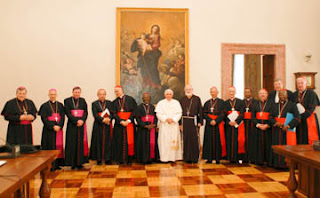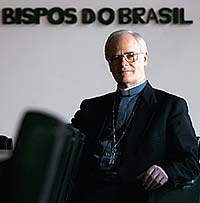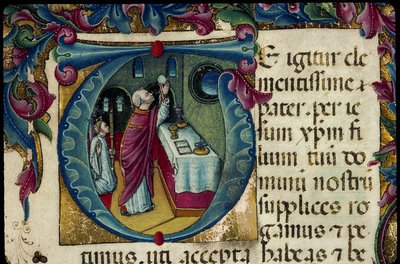
Most readers must be bored with our caveat regarding supposed contents of the motu proprio before the actual text is known, but we cannot fail to notice that several rumored aspects of the document are being presented as news... when in fact they are quite old.
For instance, the motu proprio will deal not only with the Mass, but with all rites of Sacraments. Is that news? Well, not for those who have been following the debate. Just this past May in Aparecida, Brazil, Cardinal Castrillón Hoyos said that "the Holy Father has the intention of extending to the entire Latin Church the possibility of celebrating Holy Mass and the Sacraments according to the liturgical books promulgated by Blessed John XXIII in 1962".
What about calling the Traditional Roman Rite an "extraordinary form" of the "one" Roman Rite? This academic concept has permeated the Vatican language for a couple of years. In October 2006, Cardinal Ricard, President of the French Episcopal Conference, explained that he called the Traditional Roman Rite "what the Pope calls [it]": "an extraordinary form of the Roman Rite". And this expression has been constantly repeated by Vatican officials. Once again, no news.
All supposed contents of the motu proprio being published by the press and repeated by several weblogs seem to be old news, except for one important aspect, whose appearance is new - it does not matter what it is, for why comment upon an aspect of the document if it may very well not turn out to be true? Is it not better to wait until the texts of the motu proprio and its accompanying letter are actually known?
Which is why we will keep our pre-publication caveat:
For instance, the motu proprio will deal not only with the Mass, but with all rites of Sacraments. Is that news? Well, not for those who have been following the debate. Just this past May in Aparecida, Brazil, Cardinal Castrillón Hoyos said that "the Holy Father has the intention of extending to the entire Latin Church the possibility of celebrating Holy Mass and the Sacraments according to the liturgical books promulgated by Blessed John XXIII in 1962".
What about calling the Traditional Roman Rite an "extraordinary form" of the "one" Roman Rite? This academic concept has permeated the Vatican language for a couple of years. In October 2006, Cardinal Ricard, President of the French Episcopal Conference, explained that he called the Traditional Roman Rite "what the Pope calls [it]": "an extraordinary form of the Roman Rite". And this expression has been constantly repeated by Vatican officials. Once again, no news.
All supposed contents of the motu proprio being published by the press and repeated by several weblogs seem to be old news, except for one important aspect, whose appearance is new - it does not matter what it is, for why comment upon an aspect of the document if it may very well not turn out to be true? Is it not better to wait until the texts of the motu proprio and its accompanying letter are actually known?
Which is why we will keep our pre-publication caveat:
Considering the closeness of the date of publication of the motu proprio on the liberalization of the Traditional Roman Rite and its accompanying letter, we will avoid commenting on the contents of both documents, until the actual texts are publicly known.
_______________________________
IMPORTANT NOTE: That there will be a period of time before all legal aspects of the motu proprio come into effect (what in Canon Law is commonly referred to as "vacatio legis") is not any kind of rumored content, but almost a certainty, considering the last words of the communiqué of the Holy See Press Office: "with the indication of its successive coming into effect" (con la indicazione della sua successiva entrata in vigore), that is, of when it will be ordered to come into effect. The duration of this vacatio legis (1 day after publication? 30 days? 90 days? 180 days?) is unknown at this moment and will probably only be known with the public release of the document.











